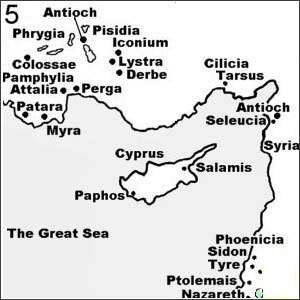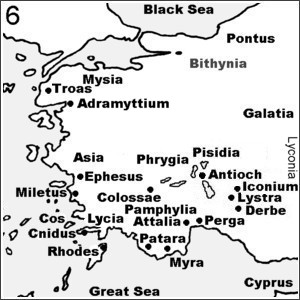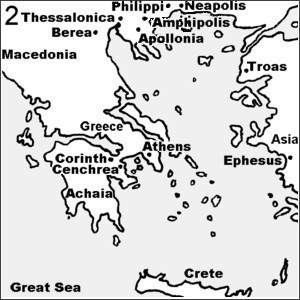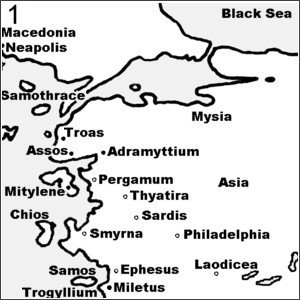
Acts 16:1-15
—Verse by verse
This page is a verse by verse study of Acts 16:1-15. These verses describe Paul’s second missionary journey as far as Philippi, and the conversion of Lydia.
Timothy joins Paul and Silas in Paul’s second journey.
Acts 16:1-15
¶“1Paul came to Derbe and Lystra. Behold, a certain disciple was there, named Timothy. His mother was Jewish and a believer. Timothy’s father, however, was a Greek. 2The brethren who were at Lystra and Iconium spoke very highly of Timothy. 3Paul wanted Timothy as a companion on his journey. So Paul took Timothy and circumcised him because of the Jews who were in those parts; for they all knew that Timothy’s father was a Greek.” (Acts 16:1-3).
¶“4As Paul, Silas, and Timothy went on their way through the cities, they delivered the decrees which the Christians were to keep and which had been decided by the apostles and elders who were at Jerusalem. 5So the churches were strengthened in the faith, and increased in number daily.” (Acts 16:4-5).
¶“6When Paul, Silas, and Timothy had gone through the regions of Phrygia and Galatia, they were forbidden by the Holy Spirit to speak the word in Asia. 7When they had reached a point opposite Mysia, they tried to go into Bithynia, but the Spirit did not allow them to go there either. 8So, Passing by Mysia, they came down to Troas.” (Acts 16:6-8).
¶“9At Troas, a vision appeared to Paul in the night. There was a man of Macedonia standing, begging him, 'Come over into Macedonia and help us.' 10When Paul had seen the vision, immediately we sought to go out to Macedonia, concluding that the Lord had called us to preach the gospel to the people there. 11So we set sail from Troas; we made a straight course to Samothrace; and the day following to Neapolis; 12and from there to Philippi. Now Philippi is a Roman colony and a major city of Macedonia. We stayed some days in this city.” (Acts 16:9-12).
¶“13On the Sabbath day we went outside of the city to the riverside, where we supposed that people would meet for prayer. There we sat down, and spoke to the women who had come together. 14One woman was named Lydia. She was a merchant of purple fabric. She came from the city of Thyatira. Lydia was one who worshiped God. When she heard us, the Lord opened her heart to heed the things which were spoken by Paul. 15When she and her household were baptized, she urged us, saying, 'If you have judged me to be faithful to the Lord, come into my house, and stay.' So she persuaded us.” (Acts 16:13-15).
1 Timothy Joins Paul and Silas
Verses 1-3
¶ "Paul came to Derbe and Lystra. Behold, a certain disciple was there, named Timothy. His mother was Jewish and a believer. Timothy’s father, however, was a Greek. The brethren who were at Lystra and Iconium spoke very highly of Timothy. Paul wanted Timothy as a companion on his journey. So Paul took Timothy and circumcised him because of the Jews who were in those parts; for they all knew that Timothy’s father was a Greek." (Acts 16:1-3).

- Timothy. This is the Timothy (or Timotheus) to whom Paul wrote the two letters that are included in our New Testaments. Timothy’s grandmother Lois, and his mother Eunice taught Timothy the word of God and faith in Christ (2Timothy 1:5, 2Timothy 3:15). Luke gives us the origin of Paul and Timothy’s deep friendship (Acts 16:1-3), such that Paul calls Timothy his "beloved son" in the faith (2Timothy 1:2, cf 1Timothy 1:2).
- Circumcised him. Circumcision was practised by Jews because it was a covenant God made with Abraham (Genesis 17:10).
Note —CIRCUMCISION: To circumcise means to cut around and remove the foreskin of the penis. This was a covenant God made with Abraham and his descendants (Genesis 17:9-14) so is practised by Jews as a religious rite.
Circumcision was not required by the gospel, because the gospel recognises an inward circumcision (Romans 2:25-29). When one becomes a Christian, one is enabled by Christ to put off the old person; the guilty conscience; the sinful desires. This is what counts.
- Because of the Jews. Why, if the gospel doesn't require physical circumcision, did Paul want Timothy circumcised? After all, hadn't he refused to circumcise Titus who had accompanied him to Jerusalem (Galatians 2:3-5)? Jewish Christians would be inclined to circumcise their sons because circumcision was a covenant with the descendants of Abraham and didn't originate with Moses (John 7:22). Paul would by no means allow any precedent for requiring circumcision of a Gentile like Titus, who wasn't the offspring of Abraham. On the other hand, Paul thought it prudent that a half Jew like Timothy should be seen to follow his Jewish side in preference to the Gentile ways of his father.
2 Strengthening the Churches
Verses 4-5
¶ "As Paul, Silas, and Timothy went on their way through the cities, they delivered the decrees which the Christians were to keep and which had been decided by the apostles and elders who were at Jerusalem. So the churches were strengthened in the faith, and increased in number daily." (Acts 16:4-5).
- The decrees. These were the decisions written in the letter from Jerusalem (Acts 15:22-29). Note that these decrees contradicted the teachers who said that Gentile Christians must be circumcised.
- Strengthened in the faith. The result of the ministry of Paul, Silas, and Timothy was positive on two counts: they strengthened the churches spiritually and increased them numerically. I think it's no accident that Luke puts strength in the faith before increase in number. It is common today for ministers to weaken the doctrine so as to increase the numbers (2Timothy 4:1-5). "Contend for the faith that was once for all delivered to the saints" (Jude 1:3).
END OF THE FOURTH SECTION OF ACTS
With this progress report (Acts 16:4-5). Luke concludes his description of the spread of Christianity into Cyprus and areas south of Galatia. Paul has completed his first missionary journey and set out on his second. He has revisited churches in Syria and Cilicia. In the fifth section of Acts, Paul travels through Galatia. Paul is then directed by the Holy Spirit to go further afield, over into Macedonia and Greece.
3 Called to Macedonia
Verses 6-8
¶ "When Paul, Silas, and Timothy had gone through the regions of Phrygia and Galatia, they were forbidden by the Holy Spirit to speak the word in Asia. When they had reached a point opposite Mysia, they tried to go into Bithynia, but the Spirit did not allow them to go there either. So, Passing by Mysia, they came down to Troas." (Acts 16:6-8).

- The Spirit forbade them. Paul wished to go and preach in a logical progression westward from city to city. But God had other plans. So Paul, Silas, and Timothy found themselves at Troas, all the intended cities left untouched. Paul must have wondered why his plan had been frustrated by the Holy Spirit. But he soon got an answer.
Verses 9-12
¶ "At Troas, a vision appeared to Paul in the night. There was a man of Macedonia standing, begging him, “Come over into Macedonia and help us.” When Paul had seen the vision, immediately we sought to go out to Macedonia, concluding that the Lord had called us to preach the gospel to the people there. So we set sail from Troas; we made a straight course to Samothrace; and the day following to Neapolis; and from there to Philippi. Now Philippi is a Roman colony and a major city of Macedonia. We stayed some days in this city." (Acts 16:9-12).

- Luke joins Paul, Silas, and Timothy. So far Luke’s narrative has been about what other people did. Here, for the first time, Luke uses the prounoun “we” to include himself. So now Paul, Silas, and Timothy have another companion in Luke.
- Philippi. Philippi was a city founded by the Greek king, Philip II of Macedon, circa 356BC. It was now, as Luke tells us, a Roman colony. As such, it was not as multicultural as the cities Paul had previously evangelised. It had almost no Jewish community and no synagogue, so Paul did not have that convenience to start his work there.
4 Lydia Converted in Philippi
Verses 13-15
¶ "On the Sabbath day we went outside of the city to the riverside, where we supposed that people would meet for prayer. There we sat down, and spoke to the women who had come together. One woman was named Lydia. She was a merchant of purple fabric. She came from the city of Thyatira. Lydia was one who worshiped God. When she heard us, the Lord opened her heart to heed the things which were spoken by Paul. When she and her household were baptized, she urged us, saying, “If you have judged me to be faithful to the Lord, come into my house, and stay.” So she persuaded us." (Acts 16:13-15).
- Women together. Somehow Paul and his companions found out that on the Sabbath, along the bank of the river Gangas, they would find a prayer meeting. This turned out to be a group of women, among them Lydia from Thyatira in Asia who now lived in Philippi and ran her business. She was not a Jew, but worshipped God. Lydia was, apparently, Paul’s first convert in Macedonia.
- The Lord opened her heart. The expression, "the Lord opened her heart" (Acts 16:14) is an acknowledgement of the presence, providence, and involvement of God in Lydia’s conversion. Unfortunately the expression is grasped by some as a proof that a person’s conversion is a special conviction of irresistable grace. This conviction arises soley from an unconditional choice made by God in favour of that person. This choice was made before the foundation of the world. This choice had no regard to any quality in the person. That's an awful lot to read into such a short and simple expression. God did not force Lydia’s heart open anymore than he forced her to go to the riverside to pray. He opened her heart with her co-operation and with Paul’s co-operation. Lydia thought of herself as "faithful to the Lord" (Acts 16:15), not as a puppet of the Lord.
- When she was baptized. Lydia referred to herself as faithful to the Lord after she had been baptized. She teaches us that those who refuse baptism, neglect baptism, or delay baptism, are not being faithful to the Lord.
